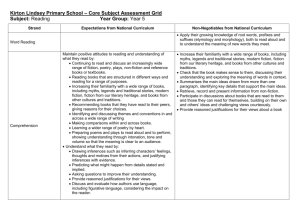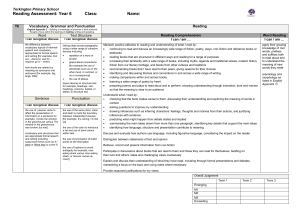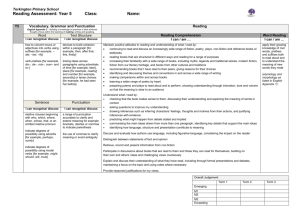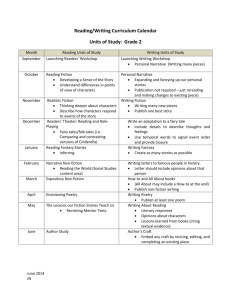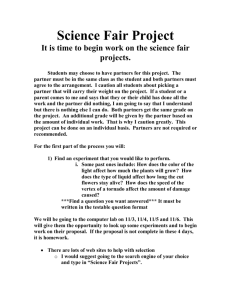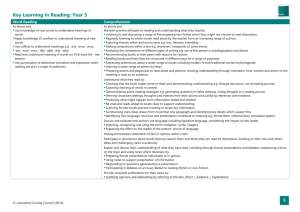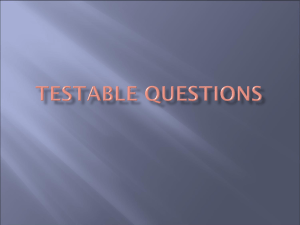Compare Y5-6 Reading objectives to framework
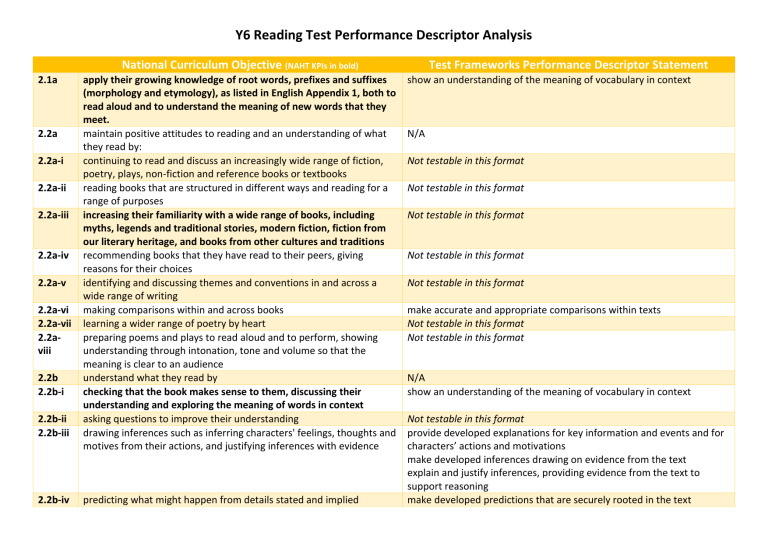
Y6 Reading Test Performance Descriptor Analysis
National Curriculum Objective
(NAHT KPIs in bold)
2.1a
2.2a apply their growing knowledge of root words, prefixes and suffixes
(morphology and etymology), as listed in English Appendix 1, both to read aloud and to understand the meaning of new words that they meet. maintain positive attitudes to reading and an understanding of what they read by:
2.2a-i continuing to read and discuss an increasingly wide range of fiction, poetry, plays, non-fiction and reference books or textbooks
2.2a-ii reading books that are structured in different ways and reading for a range of purposes
2.2a-iii increasing their familiarity with a wide range of books, including myths, legends and traditional stories, modern fiction, fiction from our literary heritage, and books from other cultures and traditions
2.2a-iv recommending books that they have read to their peers, giving reasons for their choices
2.2a-v identifying and discussing themes and conventions in and across a wide range of writing
2.2a-vi making comparisons within and across books
2.2a-vii learning a wider range of poetry by heart
2.2aviii preparing poems and plays to read aloud and to perform, showing understanding through intonation, tone and volume so that the meaning is clear to an audience understand what they read by 2.2b
2.2b-i checking that the book makes sense to them, discussing their understanding and exploring the meaning of words in context
2.2b-ii asking questions to improve their understanding
2.2b-iii drawing inferences such as inferring characters' feelings, thoughts and motives from their actions, and justifying inferences with evidence
2.2b-iv predicting what might happen from details stated and implied
Test Frameworks Performance Descriptor Statement
show an understanding of the meaning of vocabulary in context
N/A
Not testable in this format
Not testable in this format
Not testable in this format
Not testable in this format
Not testable in this format make accurate and appropriate comparisons within texts
Not testable in this format
Not testable in this format
N/A show an understanding of the meaning of vocabulary in context
Not testable in this format provide developed explanations for key information and events and for characters’ actions and motivations make developed inferences drawing on evidence from the text explain and justify inferences, providing evidence from the text to support reasoning make developed predictions that are securely rooted in the text
2.2b-v summarising the main ideas drawn from more than 1 paragraph, identifying key details that support the main ideas
2.2b-vi identifying how language, structure and presentation contribute to meaning
2.2c
2.2d
2.2e
2.2f
2.2g
2.2h discuss and evaluate how authors use language, including figurative language, considering the impact on the reader distinguish between statements of fact and opinion retrieve, record and present information from non-fiction participate in discussions about books that are read to them and those they can read for themselves, building on their own and others’ ideas and challenging views courteously explain and discuss their understanding of what they have read, including through formal presentations and debates, maintaining a focus on the topic and using notes where necessary provide reasoned justifications for their views. accurately and selectively summarise main ideas, events, characters and information in fiction and non-fiction texts identify / explain how information in non-fiction is related and contributes to meaning as a whole identify / explain how the sequence of events in narrative fiction contributes to meaning as a whole identify / explain how the choice of language enhances the meaning of texts identify / explain how the choice of language enhances the meaning of texts retrieve key details and quotations from fiction and non-fiction to demonstrate understanding of character, events and information
Not testable in this format
Not testable in this format retrieve key details and quotations from fiction and non-fiction to demonstrate understanding of character, events and information explain and justify inferences, providing evidence from the text to support reasoning
Taken from earlier parts of the Programmes of Study
National Curriculum Objective
(from other year groups)
Broadly developed across all year groups
Test Frameworks Performance Descriptor Statement
retrieve key details and quotations from fiction and non-fiction to demonstrate understanding of character, events and information
